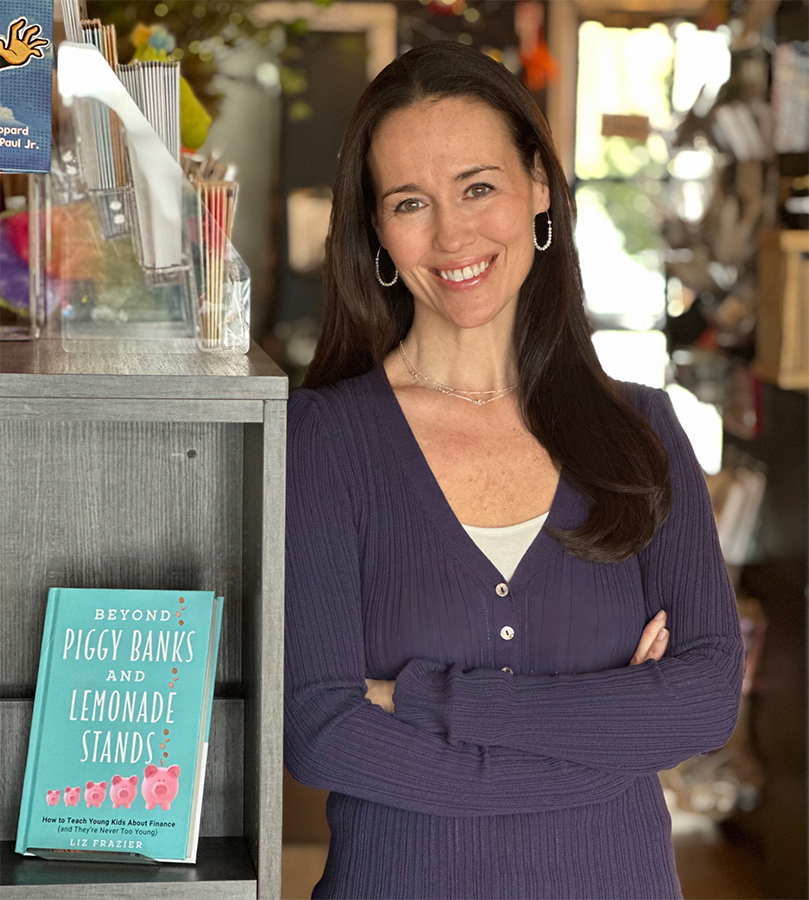Media
PRESS KIT
ARTICLES written by Liz:
Forbes – Liz is a regular contributor to Forbes. Read her articles here.
Ms. Career Girl – Why Every Adult Should (And Can!) Understand Basic Finance
The Chicago Chic – How to turn errands with your child into a budgeting lesson,
also featured in Modern Mississauga and the Motherhood Moment blog
Smart Kids with Learning Disabilities – Lemonade Stands: Business 101 for Kids
Motherly – Top 10 summer jobs for kids of all ages
Red Tricycle – How to Introduce the Concept of Charity to Your Kids
ARTICLES and INTERVIEWS featuring Liz
Television Interviews
CNBC: Invest In You
Good Morning Texas: Beyond Piggy Banks and Lemonade Stands
PHL17 Morning News: Teaching Your Kids the Importance of Charity
NBC CT Live: Teaching Charity to Kids
Video Interviews
GoDaddy – How a Small Business Owner Can Build their Local Brand in 2021
Print Interviews:
People Magazine:
–How Do I Talk to My Kid About Money?
WSJ print – The Promotion That Comes Without the Pay Raise
PBS print – Want Your Kids to Learn the Power of Money? Start a Lemonade Stand
BBC print – The camp that makes future millionaires
The Penny Hoarder:
–4 Ways to Prepare for a Financial Emergency
–How to Manage Your Money After Going From Two Incomes to One
–Piggy Banks vs. Banking Apps: Teaching Kids About Money in the Digital Age
HerMoney, from Jean Chatzky – What You Need To Know About College Financing
Bustle – How To Live Your #bestlife This Holiday Season (While Also Sticking To Your Budget)
Synchrony, Money Matters – Own Your Money in 2022
MyBankTracker – The Best Teen Checking Accounts in 2022: For Managing Money at an Early Age
Podcasts
Next Gen Personal Finance: Liz Frazier discusses her new book, Beyond Piggy Banks and Lemonade Stands
Real Life Parenting – Teaching Kids About Money
Simple Families – How to Talk to Kids about Money
That Organic Mom – How to Teach Kids About Money Matters Throughout Childhood
Raising Adults: Future Focused Parenting – Teaching Kids About Money, With Liz Frazier, Author of “Beyond Piggy Banks and Lemonade Stands”
Marriage, Kids and Money – How To Teach Young Kids About Money (And Why They’re Never Too Young) – with Liz Frazier
How To Money – Raising Financially Savvy Kids with Liz Frazier
Radio Interviews
The Lisa Show:
–How To Support Small Businesses During COVID
Fox News Radio – Spent Too Much Over the Holidays?
KSFR Radio:
–Wake Up Call for November 2018
–Savvy Spending–How to Talk to Your Kids About Spending
–How to Talk to Your Spouse About Spending-Carefully
–Don’t Be a Victim of Obituary Scams
–When Parents Move in With Adult Children

Liz answers your questions
Isn’t my child too young to get this stuff? Why can’t I wait to teach my child about finances when they’re older?
Shockingly, children can begin to develop money habits as early as seven. Most parents feel there is no way their seven-year old is going to comprehend what a bank does or how interest is determined, but don’t underestimate your child. Remember the last time you said a curse word in front of your child, or promised them they would get a bike next year? It’s shocking (and often inconvenient) what children can learn and remember, especially when they don’t seem to be paying attention. This being said, can you wait until they are 12 to teach them about finance? Sure. But you wouldn’t wait to teach your pre-teen the basics of any other skill most children acquire, such as swimming or riding a bike. Same goes with finance. They’ll be fine if they have a lack of economic knowledge as a teen, but financial management should be seen as another important life skill that needs to be started early. Don’t give them the opportunity to develop bad habits that may be hard to change. Get them started on the right track as they are learning money – you want their early experiences with money to be positive because these will shape their values as they get older.
How can I freshen up on my own knowledge about finances if I’m not savings-savvy?
Finance is intimidating to many, and for good reason. Don’t worry if you are one of the many who gets anxious or annoyed just by hearing the word “finance”. You don’t have to understand the ins and outs of ETFs to be financially healthy. All you need is the core foundation of how to budget, understand your net worth, how to save and avoid debt. Plus, you actually know way more than you think you know. You buy groceries, you budget everyday (even if you don’t realize it), pay bills and plan purchases. You have the most valuable tool in your corner for teaching finance: experience.
How should I establish an allowance system for my kids, and what are some of the benefits of creating one?
Allowance is one of the best ways for your children to understand money! Young kids can make their own money through activities like garage sales, raking leaves or dog washing business. Another great way to let kids experience money first hand is through allowance. Allowance has become a hot button among parents, and everyone is worried that if they do it the wrong way they will end up with an entitled and damaged child. There are several different allowance methods. The traditional one is based on tying allowance directly to chores. A more modern take is to give an allowance that is separate from chores. A hybrid approach allows parents to use the best of both worlds. Regardless, no matter what anyone says, there is no confirmed “right” way to give an allowance. It depends on the child and the family. As long as you aren’t putting them in harm’s way, or giving them too much money, you’re probably not causing irreparable harm. You know your child. If one approach will clearly work better for your particular child, use that one. Just make sure you are consistent, manage expectations and keep it positive, and never threaten to take away allowance as punishment.
Won’t my children learn financial literacy in the classroom? And if not, how does this affect how I will teach them about finances?
The short answer is probably not, As ludicrous as it is, finance is not a mandatory high school course in most states. In fact, only 17 states require that high school students take a financial course. And it’s not even on the radar for most elementary and middle schools. The good news is the subject of financial literacy for children is getting more attention, so there is more of a focus now among local and state policy makers, major federal agencies and the media to push for teaching kids personal finance in schools. But we’re not there yet. Until then, parents are the primary source of information for their kids. And the truth is, even when all schools teach personal finance to students, parents will continue to be the most influential source of information for their kids.
What is an example of a kid activity, and what does it teach?
The activities provided throughout the book are meant to be simple, relevant and incorporate real-life everyday living. One example from the book that illustrates the concept of budgeting and spending responsibly is Real World Activity: School Accounts Many kids in elementary schools now have some form of electronic money account with their school, usually used for drinks, snacks and lunches. Parents can add money into their child’s account, and the child can use as they need. If your school has this system, let your child practice budgeting with their account. Start small, by telling them that this week you will put $5 (or whatever is appropriate for your child) on their card, and they can spend it however they want. The key is to tell them that they will not get any more money that week, so they need to decide how to spend their money smartly. If they load up on snacks Monday morning and run out of money, they may have to bring only their snacks from home the rest of the week. You can up the stakes as they get older. Give them money for the full month. You can then try including lunch in their budget. If they use their money before the end of the month, they will have to make their own lunch at home to bring to school. Your child will learn firsthand what a budget is and why it’s important. If they make a mistake, they will feel real consequences and not want to make that same mistake again.
How can busy parents find time to teach children this massive subject?
A lot of the teachings are incorporated into things you are already doing, or conversations you would already have with your child. Many of the activities and games are things you can do anytime, or are incorporated into activities you already do every day. Also, a lot of the building blocks needed to understand finance are skills you are already working on, like decision making, delayed gratification and priorities, and encouraging positive attitudes.
Shouldn’t we teach our children that money isn’t everything? Is this going to stress children out?
Money has a bad rap, because often it’s used to judge someone, or talked about in the context of envy or greed. But money management itself is not a controversial subject. There’s little that’s less sexy, and more vanilla than budgeting techniques. Money isn’t everything, and being wealthy just for the sake of being wealthy should not a goal. But money is important, and children should understand the real reasons it’s important. Money provides protection, security and opportunities. It is needed for the daily essentials necessary to live, plus it can help others get those same essentials. As parents teaches these concepts to their children, it’s important that they treat it as any other subject. Try to keep it neutral and don’t project any financial stress you may feel personally onto the subject as a whole.

Get Started on Your Financial Journey
Liz's Custom Net Worth Estimator will calculate your Net Worth! Plus, you'll receive monthly tips and resources to start your journey to building financial wealth and health.
